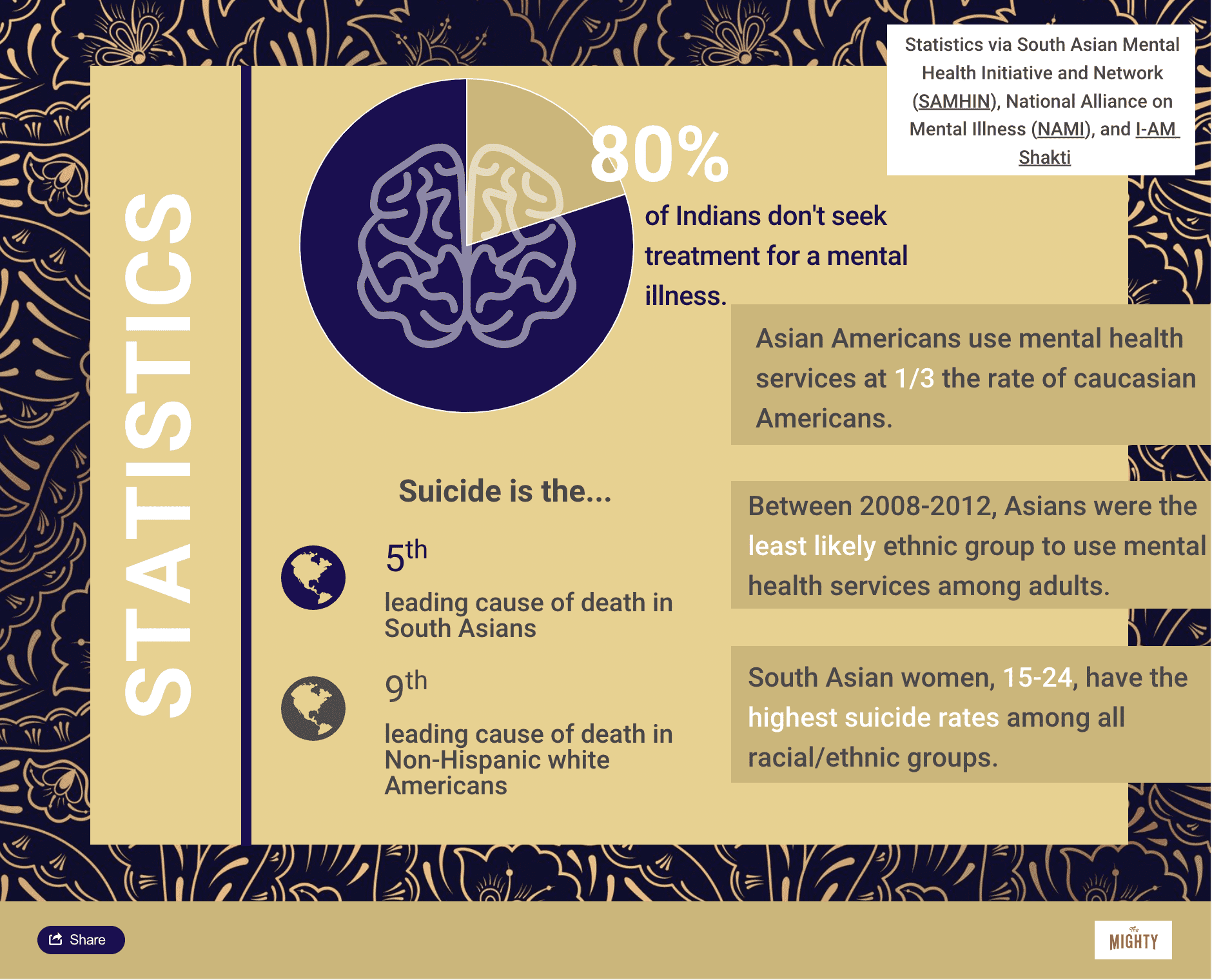Why Is Mental Health Stigmatized in South Asian Communities?
This is part two of a three part series dedicated to discussing the stigma around mental illness in South Asian culture.
Stigma is a beast that is hard to conquer, particularly when it becomes ingrained in a culture’s mindset and tradition. The strong stigma attached to mental illness in South Asian culture is one that has evolved for many reasons.
To understand why, The Mighty spoke with psychiatrist Vasudev Makhija, M.D., president of the South Asian Mental Health Initiative and Network (SAMHIN); Rahul Kulkarni, CEO and co-founder of The Sukhi Project; and clinical psychologist Rukhsana Chaudhry, Psy.D., director of Mental Health Programming for American Muslim Health Professionals (AMHP).
When Dr. Makhija moved to New Jersey from India, he saw a larger number of South Asians immigrating to the Garden State between 2000-2010. He took notice of disparities in mental health care and other issues that South Asians faced and decided to take action by starting SAMHIN.
“South Asians are very acutely conscious of their public image,” Makhija told The Mighty. “We, as South Asians, are overly concerned about what people think of us. Seeking help is seen as a sign of weakness. We are taught to be able to “solve our problem by ourselves.”
Makhija added:
Often people believe that mental illness is caused by lack of self-discipline or mental weakness. Individuals with mental illness are judged on moral and character grounds…By admitting to having mental illness they risk being judged as being bad or morally weak individuals. Instead of risking being judged, they avoid speaking about it and seeking help. This results in delays in treatments with prolonged suffering for the individual and the family, and disastrous consequences.
In order to combat stigma, it is important to understand why it exists. South Asian culture holds education and family values on a pedestal, but as positive as those facets can be, they create a different kind of pressure than most are accustomed to. Trying to fit an ideal image isn’t healthy, especially when it is not who you are, and comes at the expense of your mental health.
“The stigma can be truly crippling within the Asian community,” Kulkarni said. “It’s a strong community, but one based on sharing good news with each other. When there’s a problem, I see people often suffering in silence. It can cripple one’s ability to perform…be that as a student, professional, family member, partner, etc.”
This behavior only perpetuates the stereotypes already embedded in South Asian society. These stereotypes can include anything from believing that mental illness doesn’t affect people who more educated to the idea that mentally ill people are inherently violent. Neither of these, however, are true.
“I feel a lot of this plays out in the idea of a ‘model minority,’ that somehow we’ve overcome institutionalized racism since many Asians fill prestigious academic halls and professional guilds,” Kulkarni said. “Yet there’s no need for mental illness to be looked down upon, nor the idea of wanting to build mental resilience. Just like any other muscle, the mind needs to be exercised and cared for.”
Stigma in South Asian culture has been around for ages, but the process of eliminating it or just opening up a conversation is still slow. Though younger generations are more open to discussion, Makhija said generational differences still affect them. “Coming from a background of arranged marriages, parents ‘hide’ the fact that their ‘child’ has mental illness because of the fear that if others find out about the mental illness, it will decrease the prospects of finding a match and marriage.”
This behavior furthers the sense of shame that stems from stigma. “Mental health really gets attached to this idea of shame, and shame is something that is prevalent in the culture itself anytime there’s this sense of something that would not be seen well or beneficial to your family and wanting to protect that family,” Dr. Chaudhry told The Mighty. “They’re sometimes stigmatized to the point that they’re not effectively seen as a part of the community, or they’re often hidden within their own families.”
Not only does stigma make it hard to talk about mental illness, it also makes it difficult to get mental health treatment. Treatment is often necessary for mental illness recovery, but when you face stigma, it’s not easy to access care.
“If you cannot go within your family and you can’t go directly to a resource in the community because of the fear of shame, stigmatization, dishonoring your family, the principles that come with a cultural piece, you are now trying to really get through a maze in order to have an effective treatment for an issue you’re dealing with or experience counseling in an effective manner,” Chaudhry said.

Read more from this series:

